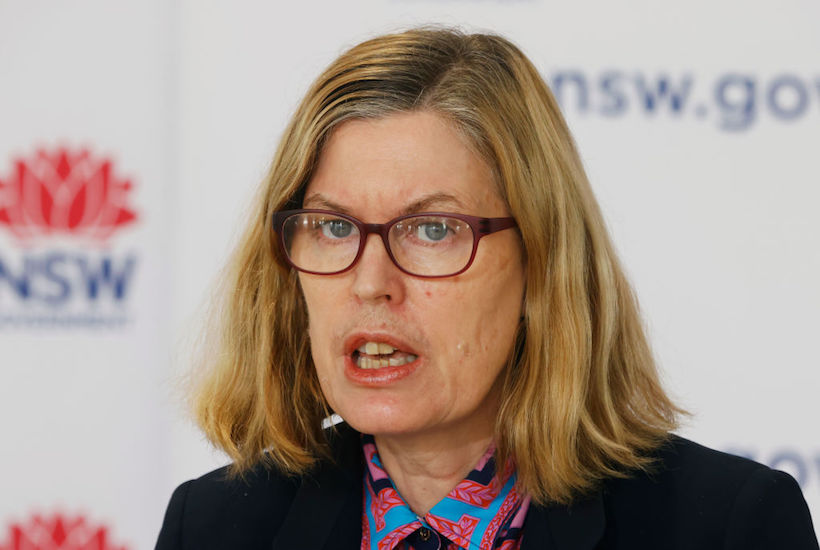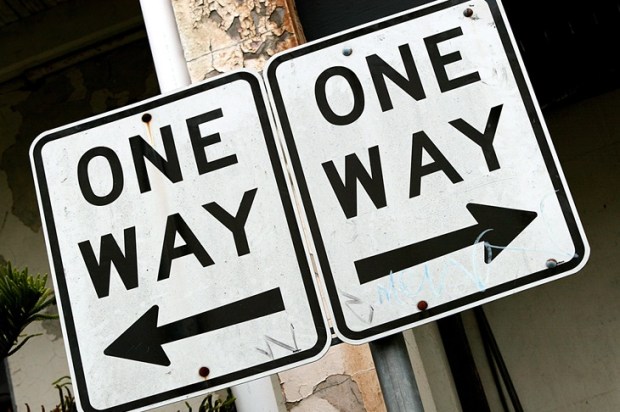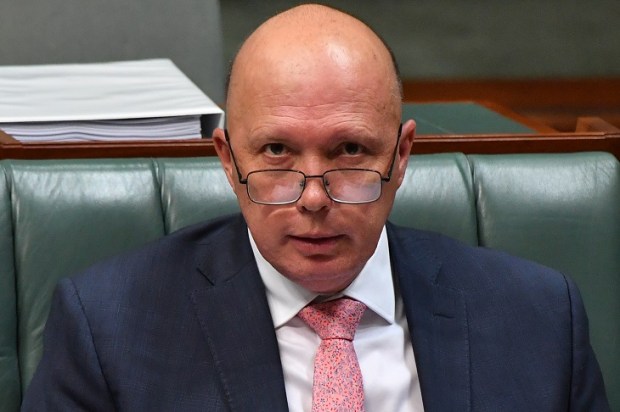Of all the known unknowns of the Covid-19 pandemic, of who to blame and of how to act, one certainty remains: that the impact of the virus has spawned an entire vocabulary inscribed into the symbolic order. LGA’s, Contact tracing, Red Zones, Self-isolation, Tier one, two and three Exposure Sites, Close Contacts, COVIDSafe, Stop the Spread, Flatten the Curve, Do The Three To Stay Covid Free.
Thousands of Australians have been tuning-in to the official Covid-19 press conferences held by the secular priests of our time whereby the High Priestess of Epidemiology and the Archbishop of Public Health pantomime control through the invention of jingoistic neologisms like “Donut Days”. Governance has been reduced to a bureaucratic exercise in dispute resolution and its representatives likewise have begun addressing the public as though they were social media interns for Krispy Kreme.
In the same vein that the phrase “unattended baggage” has taken root in the post-911 collective psyche — such that an “unexpected item in the bagging area” turns your garden-variety avocado theft into an act of micro-terrorism — how will the official language of Covid-19 manifest itself in the months and years to come?
Political philosophers and public intellectuals such as Michel Foucault, Paul Goodman, Ivan Illich and Giorgio Agamben have theorised the ways in which credentialed experts are exercising ever greater control over everyday life.
Foucault warned that the rising tide of history is continually shifting away from antiquated modes of control, such as the public spectacle of punishment, towards more nebulous forms of power that involve data modelling and surveillance that micromanage the education, health, and sex lives of individuals under the auspices of scientific neutrality.
Accordingly, rally cries to ‘defund the police’ or ‘abolish prisons’ will likely cosmetically reconfigure what today’s control society looks like by outsourcing the authority to whatever new iterations of social workers, mental health experts and criminologists will be required to meet the demands of newer surveillance technologies.
Responses to the Covid-19 pandemic has proven to be no exception. During the daily state press conferences, authorities have appealed specifically to the fact that they are following the free-floating signifier of “The Science” as a means of legitimating control.
As with the architecture of most institutions, the state response to the pandemic has had a tripartite trajectory: firstly it has reinforced our collective belief in progress as the animating force of our times. Secondly, it has made manifest the impossibility of this myth and thirdly it has explained that our inability to achieve it is the fault of individual actions of the unmasked, the unvaccinated or the non-compliant rather than considering the role that several decades of neoliberal policy has played in stripping the copper wiring for scrap metal from the walls of our housing, education and healthcare systems.
One of the most banal aspects of the pandemic has been the ways in which the professional managerial class have been able to substantiate the mythology of their own self-importance in antagonism to the “uneducated” and the “misinformed.”
The market has swiftly reconfigured itself to meet the needs of the present moment. The result, of course, has been a kabuki theatre of one-upmanship in which mask wearing, social distancing and elaborate displays of vaccine status can be used as a means with which to signal your adherence to or rebellion from the dominant narrative.
Entire cottage industries have been created and embraced by consumers with a cargo-cult enthusiasm and marketing consultants have brainstormed endlessly about how to make masks, hand sanitiser and QR codes appear less sinister. The table with wet-wipes at the front of my local supermarket is called a “sanitation station,” my local pharmacy sells hand-sanitiser disguised as a “purifying hand treatment” and my favourite clothing brands have pivoted towards loungewear for “these uncertain times.” The accoutrements of the covid-19 pandemic are clearly here to stay given how easily they can weaponised towards crypto-puritan displays of tolerance and conscientiousness.
As Byung-Chul Hang notes, the “neoliberal labor camp has acquired a new name: the home office.” Zoom meetings have proven to be the ideal communicative medium for the narcissistic age in which every workplace interaction is mediated by the image of oneself. Work-from-home scenarios, Hang explains, are often more taxing than traditional office spaces because the final vestiges of a disciplinary society have been replaced by the deregulated rhythms of cognitive capitalism. The distinction between our public and private lives, with their own social and geographical configurations, no longer exists when we are able to seamlessly work, socialise and consume through the one technological apparatus.
Over the past few years, certain foot soldiers in the culture war have displayed a libidinally-invested obsession in dissecting the minutiae of online media discourse. Every week a new puff piece would be published about why “silence is violence,” why “X film has a gender/race problem” or why “Y’s tweet was problematic because it constituted Z-erasure.” What has become clear throughout the pandemic is that the professional managerial class is interested only in critiquing language when it aligns with liberal orthodoxy.
The ability for white-collar workers to “stay home and save lives” while ordering soy burgers for delivery, “anti-vaxxer tears” coffee mugs and “Pfizer Alumni 2021” t-shirts online is contingent on an entire underclass of workers both at home and overseas who enable the conditions of possibility for their inflated sense of self to unfold.
When tradesmen began protesting the lockdown measures in Melbourne, Australia, the liberal media machine was quick to defuse their political potential by labelling them as “anti-science” and “conspiracy theorists” rather than taking their demands seriously.
The left, who have historically condemned the sensationalism of mass media coverage on rioting and protests, immediately distanced themselves lest they be accused of co-conspiracy (even though it is the working class who will most likely be subjected to the rigmarole of future restrictions on movement and employment.) As Alex Gutentag reported, in the last two years which saw the greatest wealth transfer in human history, “Experts, technocrats, and corporations became the heroes of the pandemic, while the masses became the villains.”
During the early days of the pandemic, Georgio Agamben became one of the heretical bad-boys of academia for denouncing Italy’s pandemic response. He railed against the popularisation of the term “social distancing.”
The conception of the masses has been inverted through social distancing measures so as to refer now to a symbolic collection of atomised, individual existences who are unable to mobilise, socialise, celebrate or mourn for their dead.
The government and its media henchmen have inculcated an atmosphere of fear and hostility centred around the lives you could either lose or save simply by choosing to participate or abstain from everyday, civic activity.
The modus operandi of our times, as evidenced by the language of everyday, is geared toward the preservation of bare biological existence. Agamben concludes that “a norm which affirms that we must renounce the good to save the good is as false and contradictory as that which, in order to protect freedom, imposes the renunciation of freedom.”
If the pandemic has shown us anything it is that the more nebulous the threat, whether real or imagined, the more easily it can be appropriated towards stoking fear and engendering obedience.
The climate of paranoia fomented by death tallies, outbreak maps and press conferences are then instantiated in everyday interactions in which every person is treated with suspicion as a possible vector for death and disease. The animosity towards intellectual inquiry is such that to critique the government’s response in any way (apart from suggesting that the restrictions should have been harder, longer and more extreme) is tantamount to doing “a science denial.”
Alain Badiou speaks of Art, Love, Politics and Science as seperate “truth procedures,” independent from one another. In his Manifesto for Philosophy, he claims that philosophy is unique in its ability to think through truth procedures qua truth procedures and to be able to exist at their intersections. The danger, according to Badiou is when philosophy defers its intellectual energy entirely to another truth procedure resulting in a myopic description of the events at hand.
The process by which so-called liberal democracy has been slowly ceding ground to the techno-medical despotism of unelected experts at the expense of love, politics and art began long before the pandemic and will continue long after it but it took an event as global in scale as Covid-19 to realise its true expression.
Dissident voices have never been more urgent but they will require the courage of their own convictions to confront the low-grade hostility that dominates today’s cultural landscape.
Got something to add? Join the discussion and comment below.
Get 10 issues for just $10
Subscribe to The Spectator Australia today for the next 10 magazine issues, plus full online access, for just $10.

























Comments
Don't miss out
Join the conversation with other Spectator Australia readers. Subscribe to leave a comment.
SUBSCRIBEAlready a subscriber? Log in